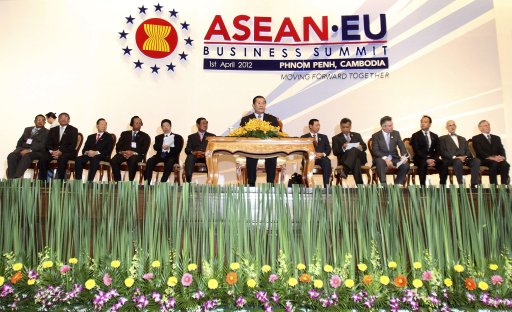 Cambodia's Prime Minister Hun Sen (C) attends the opening ceremony of the 2nd ASEAN-EU business summit meeting in Phnom Penh April 1, 2012. Also pictured are (L-R): Cambodia's Deputy Prime Minister and Chairman of the National Authority for Combating Drugs Ke Kim Yan, Chairman of the Council for Agricultural and Development (CARD) Yim Chhay Ly, Minister of Economy and Finance Keat Chhon, Minister of National Defense Tea Banh, Minister in charge of the Council of Ministers Sok An, Minister of Interior Sar Kheng, Cambodia's Prime Minister Hun Sen, Minister of Commerce Cham Prasidh, ASEAN Secretary-General Surin Pitsuwan, EU Trade Commissioner Karel De Gucht, President of Cambodia's Chamber of Commerce Kith Meng, Ambassador of the European Union to Cambodia Jean-Francois Cautain and Chairman of European Chamber of Commerce in Cambodia Dominique Catry. REUTERS/Samrang Pring (CAMBODIA - Tags: BUSINESS POLITICS)
Cambodia's Prime Minister Hun Sen (C) attends the opening ceremony of the 2nd ASEAN-EU business summit meeting in Phnom Penh April 1, 2012. Also pictured are (L-R): Cambodia's Deputy Prime Minister and Chairman of the National Authority for Combating Drugs Ke Kim Yan, Chairman of the Council for Agricultural and Development (CARD) Yim Chhay Ly, Minister of Economy and Finance Keat Chhon, Minister of National Defense Tea Banh, Minister in charge of the Council of Ministers Sok An, Minister of Interior Sar Kheng, Cambodia's Prime Minister Hun Sen, Minister of Commerce Cham Prasidh, ASEAN Secretary-General Surin Pitsuwan, EU Trade Commissioner Karel De Gucht, President of Cambodia's Chamber of Commerce Kith Meng, Ambassador of the European Union to Cambodia Jean-Francois Cautain and Chairman of European Chamber of Commerce in Cambodia Dominique Catry. REUTERS/Samrang Pring (CAMBODIA - Tags: BUSINESS POLITICS)A Global View
By DR. BETH DAY ROMULO
April 16, 2012,
MANILA, Philippines — The 20th Summit Meeting of the Association of Southeast Asian Nations (ASEAN) held this year in Cambodia, concluded on April 4th after two intensive days, in which leaders of the 10 ASEAN countries – Brunei, Cambodia, Indonesia, Laos, Malaysia, Myanmar, the Philippines, Singapore, Thailand, and Vietnam – tackled problems of regional security, human rights and illegal drugs. Making his first trip abroad this year to Cambodia, President Aquino pushed for the creation of a legally binding Code of Conduct to address the conflicting claims in the South China Sea. While in Phnom Penh, he also took the occasion to oversee the negotiation of a Free Trade Agreement that would allow tariff-free raw materials to move from one country to another, and he urged North Korea to cancel its rocket launch, suggesting that North Korea could better spend its resources on food security.
The host of this year’s ASEAN summit meeting, Cambodian Prime Minister Hun Sen, urged fellow members to strengthen their cooperation in preparation for the proposed integration of the 10-nation regional bloc in 2015 and work toward the realization of one ASEAN community which would include a single investment system to facilitate the free flow of goods and services and labor. He also cautioned the other leaders to respect the rights of migrant workers, oversee the scrapping of trade barriers, and ensure that necessary infrastructure is being developed.
ASEAN will launch a $485-million infrastructure fund next month. Co-financed by ASEAN and the Asian Development Bank (ADB), the fund is designed to provide financing for infrastructure projects in the region. The Philippines intends to present several project proposals.
Following the election in Myanmar, on April 1st in which democracy activist Aung San Suu Kyi was elected to a seat in Parliament, the leaders of the ASEAN countries called on Western countries to lift their sanctions on Myanmar “immediately in light of significant positive developments.”
Myanmar’s most powerful ally, China, also welcomed the election victory. During the period when sanctions blocked any investment from the West, China took the opportunity to invest heavily in Myanmar’s inadequate infrastructure, building much-needed hydropower dams and oil and gas pipelines which facilitate the export of Myanmar’s oil and gas reserves, and help with South China’s growing energy needs.
The host of this year’s ASEAN summit meeting, Cambodian Prime Minister Hun Sen, urged fellow members to strengthen their cooperation in preparation for the proposed integration of the 10-nation regional bloc in 2015 and work toward the realization of one ASEAN community which would include a single investment system to facilitate the free flow of goods and services and labor. He also cautioned the other leaders to respect the rights of migrant workers, oversee the scrapping of trade barriers, and ensure that necessary infrastructure is being developed.
ASEAN will launch a $485-million infrastructure fund next month. Co-financed by ASEAN and the Asian Development Bank (ADB), the fund is designed to provide financing for infrastructure projects in the region. The Philippines intends to present several project proposals.
Following the election in Myanmar, on April 1st in which democracy activist Aung San Suu Kyi was elected to a seat in Parliament, the leaders of the ASEAN countries called on Western countries to lift their sanctions on Myanmar “immediately in light of significant positive developments.”
Myanmar’s most powerful ally, China, also welcomed the election victory. During the period when sanctions blocked any investment from the West, China took the opportunity to invest heavily in Myanmar’s inadequate infrastructure, building much-needed hydropower dams and oil and gas pipelines which facilitate the export of Myanmar’s oil and gas reserves, and help with South China’s growing energy needs.

No comments:
Post a Comment